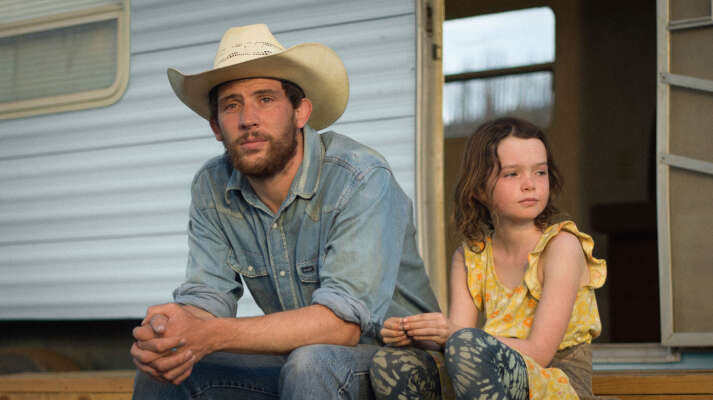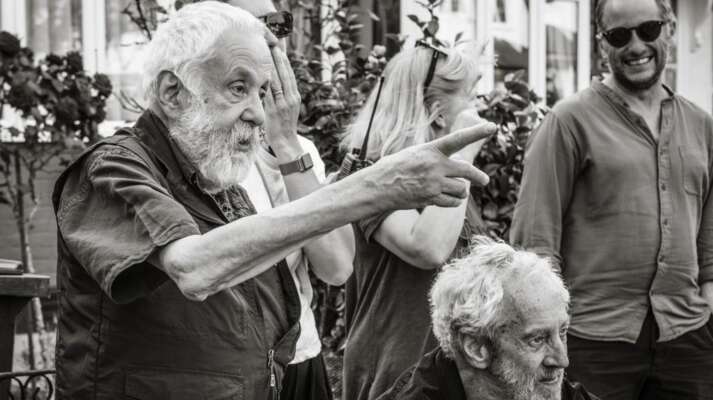Andrew Garfield's Depth of Emotion
Films and plays that show why the star of Breatheis one of the best actors today.
Andrew Garfield's Depth of Emotion
Written by Peter Bowen
When Andrew Garfield was sent the script for Andy Serkis’ Breathe, he immediately got the powerful message of hope at the heart of this real-life love story. “I found that very inspiring,” he explained. “There’s this whole issue of choosing joy in your life above all other ways, no matter what.” Garfield plays Robin Cavendish, an adventure-loving, athletic man whose future is permanently altered when he contacts polio in Africa. With the unflagging love of his wife, Diana (Claire Foy), Robin finds the courage to move beyond the constraints of medical science to live his life to the fullest. For his costar Foy, Garfield was able to fully represent the many dimensions of his inspiring character. “He has an amazing ability to be strong and masculine, but also completely vulnerable and open,” says Foy. “It’s rare you get all that in a younger actor.” In his short career, Garfield has continually been called on to play characters facing spiritual, ethical, and emotional challenges that would confound men twice his age. And with each new role, he reveals an actor eager to embrace the full range of human experience, from despair to hope to joy.

The Sensitivity and Originality of Never Let Me Go
In Mark Romanek’s adaptation of Kazuo Ishiguro’s Never Let Me Go, Garfield is cast as character confronting an impossible future. Set in three different time periods, the film follows three characters––Kathy H (Carey Mulligan), Tommy D (Garfield), and Ruth (Keira Knightley)–who learn they are actually clones whose ultimate fate is to have their organs harvested. Going beyond the film’s dystopic vision, Garfield found at its core a larger embrace of human potential. "I think it can be a call to arms for that kind of excitement about life," he told MTV News. Garfield’s comprehensive understanding of character and plot was not lost on Romanek, who cast Garfield for bringing “a sensitivity and originality to how he approaches things, which means he's always watchable and surprising.” And critics agreed, with the Los Angeles Times naming him “one of the most gifted of young British actors.”

The Profound Empathy of 99 Homes
After swinging into the popular imagination as Spiderman, Garfield brought to the screen a darker side of the American dream in Ramin Bahrani’s 99 Homes. Garfield plays Dennis Nash, a construction worker who loses first his job, then his home, during the housing crisis of 2008. In a desperate attempt to win back his foreclosed property, he ends up working for the shady real estate dealer (Michael Shannon) who evicted him in the first place. For his two leads, Bahrani didn’t so much cast the actors as rework his drama to fit their unique acting styles. “The more I knew them, the more I would try to weave in a mix of who they were and how they saw it,” Bahrani told Interview Magazine. To discover his character, Garfield did extensive field research, traveling to Florida to interview people whose lives had been upended by the recession. But he also looked inside himself. “I do know what it feels like to be deemed worthless,” Garfield told Screen Rant. “To be shut out of my life and to be ostracized by a system that’s supposed to be serving me.” To capture the full tragedy of the story, Garfield plumbs with unerring honesty the terrifying descent of his character. “It’s almost painful to so empathize with a character who we know is losing his way so irrevocably,” wrote Indiewire. “But Garfield makes it impossible not to.”

Finding the Heart of Hero in Hacksaw Ridge
Andrew Garfield had no idea when Mel Gibson approached him to play the lead in his World War II drama Hacksaw Ridge it would lead to an Academy Award nomination for Best Actor. For him, it was the story of Desmond Doss and working with Gibson that inspired him. Garfield, for whom Mahatma Gandhi was a childhood hero, was immediately drawn to the figure of Doss, a conscious objector who saved the lives of 75 wounded men without carrying a gun. “I just longed to know this man deeper and to attempt to express his essence and share his story with as many people as possible,” Garfield told Entertainment Weekly. In addition to consuming books about and watching film footage of Doss, Garfield visited Doss’ home where, as he told Backstage, there “was something spiritual that kind of happened.” That emotional epiphany certainly found its way into his screen performance. “The film's firm anchor, its moral compass and its considerable heart is Garfield,” wrote The Hollywood Reporter, “inhabiting his frontline position as both character and performer with extraordinary fortitude and grace.”

The Spiritual Search of Silence
While getting to work with Martin Scorsese on Silence fulfilled a lifelong dream, the emotional journey Garfield took to find his character realized an even deeper need. Garfield plays Father Sebastião Rodrigue, a Jesuit priest who, along with Father Francisco Garupe (Adam Driver), set off for 17th century Japan to locate a mentor who they fear has committed apostasy after being tortured. As a Christian in a foreign land, Rodrigue endures one torment after another as his Japanese captors push him renounce his faith. To comprehend the kind of faith his character was willing to die for, Garfield completed the spiritual exercises of St. Ignatious Loyola, a set of meditations and prayers that provide a path for supplicants to discern God's will. “It became a very personal journey for me,” told The Hollywood Reporter.. “So that I could allow the events of the story to affect me in the way that a young, ambitious, intelligent, articulate, learned Jesuit would respond to being dropped into the front lines of the battle for Christianity." Because of this journey Garfield found a profound connection to his character. Garfield “generates genuine emotion as a guy who’s fighting not just for his life but also his spiritual well-being,” exclaims USA Today..

Leaving it All on the Stage
While Garfield made his name in film, he cut his teeth on the stage, a platform he consistently returns to with critical acclaim. In 2004, just out of drama school, Garfield was awarded the Evening Standard Theatre Awards’ Outstanding Newcomer Award for his performance in a stage adaption of Ken Loach’s 1970 film Kes. In 2012, he won over Broadway with his stellar performance in Mike Nichols’s revival of Arthur Miller’s Death of a Salesman with Philip Seymour Hoffman in the title role. “The play belongs to Garfield and Hoffman, as it must,” wrote Vulture. “Both know how to weaponize language. (Garfield, especially, has used his Brit’s ear for High Brooklynese to great declamatory advantage).” In London’s National Theatre 2017 staging of Tony Kushner’s Angels in America, Garfield goes all out as Prior Walter, a gay man living with AIDS who finds his identity turned upside down after a divine visitation. “Garfield steams into the part with savage wit, burning intensity and total commitment––it is a weird, taxing, hilarious role, and he owns it, the best thing here, one of the performances of the year,” exclaims Time Out London.


